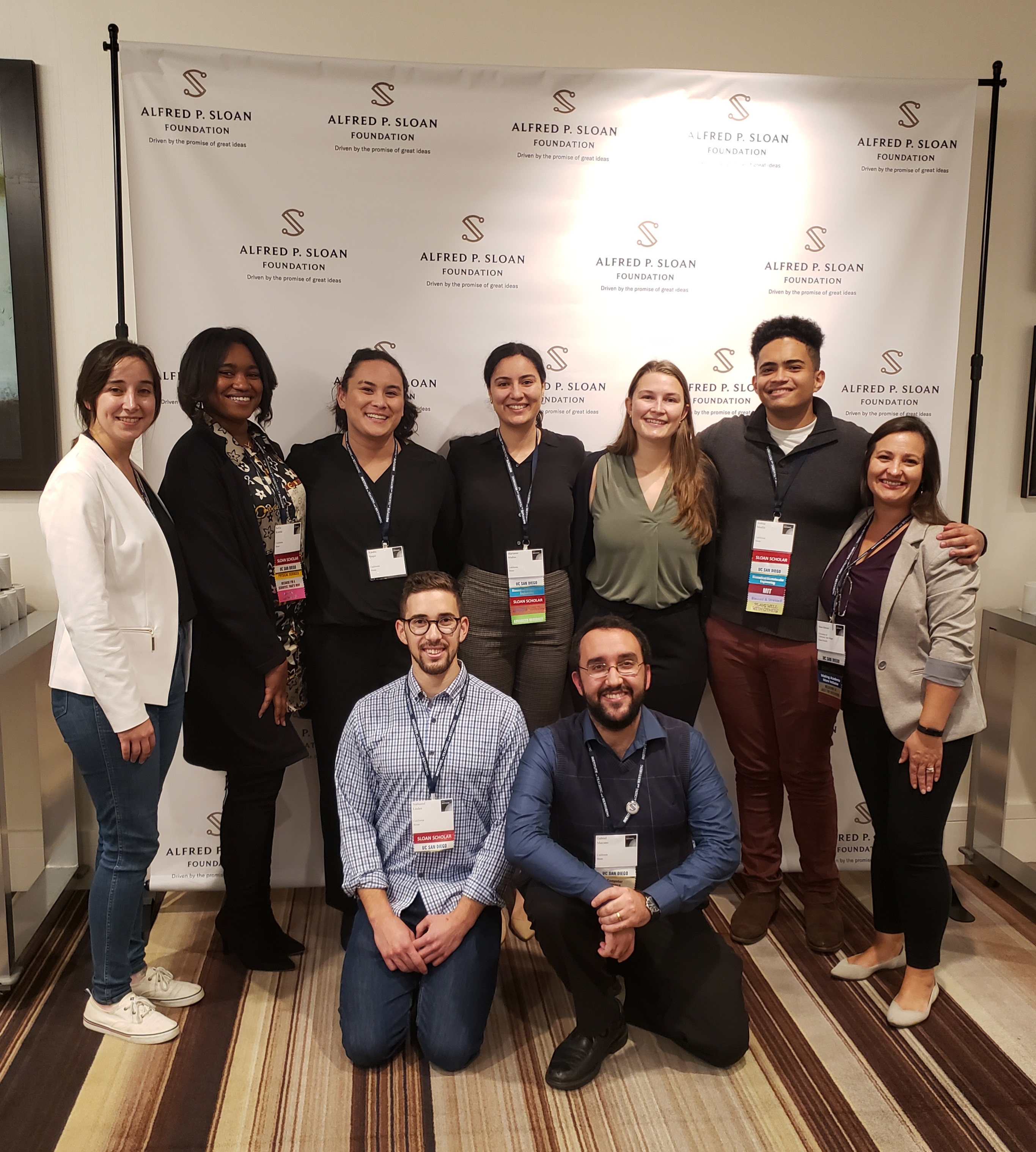Sloan Scholar Fellowship Application
UC San Diego is designated a University Center of Exemplary Mentoring (UCEM) through a generous grant from the Alfred P. Sloan Foundation. UC San Diego is committed to be fully inclusive and supportive of all students, and believes that a diverse graduate student body enhances the quality of the educational experience for all students.
The UCEM provides financial and professional support to accelerate and catalyze the success of doctoral students. The Sloan Scholar Fellowship is awarded to 12 incoming graduate students in the School of Physical Sciences or the Jacobs School of Engineering.
Questions about the application process may be directed to the academic department/program or to the Graduate Admissions Office at gradadmissions@ucsd.edu.
Eligibility
- Applicants must be U.S. citizens.
- Applicants must be recommended for admission to UCSD for the Fall term in one of the following doctoral programs:
- Physical Sciences: Chemistry/Biochemistry, Mathematics, Physics.
- Jacobs School of Engineering: Bioinformatics and Systems Biology, Bioengineering, Chemical Engineering, Computer Science and Engineering, Electrical and Computer Engineering, Mechanical and Aerospace Engineering, Materials Science and Engineering, Nano-Engineering, Structural Engineering.
- Applicants for the fellowship must provide responses to at least two of the seven short answer areas found under the Additional Educational Experiences section of the online application for admission.
Fellowship Application Instructions
Interested applicants for the Sloan Scholar Fellowship award must:
- Complete the online application for admission
- Demonstrate strong academic achievement
- Provide responses to at least two of the seven short answer questions found under the Additional Educational Experiences section of the online application for admission. Responses should be brief (between 3-5 sentences per area) highlighting how the applicant overcame barriers, and/or demonstrates a commitment to diversity. The seven questions are:
- Leadership (e.g. coordination of volunteer activities, board member in student organization, residential life, student government etc.) etc.)
- Overcoming Adversity (e.g. overcoming educational, social, cultural, economic, barriers, or barriers related to accessibility, etc.)
- Community Involvement (e.g. volunteer service, organizing, activism, teaching, mentoring, counseling, community art production etc.)
- Social Justice Experience (e.g. addressing systemic inequality through education, organizing, activism, mentorship, counseling, outreach/access, survival and development work, event planning/coordination, community building and development, etc.)
- Personal or Professional Ethics (e.g. experience with an ethical code, conduct seminars, IRB training, etc.)
- Research (e.g. undergraduate research, involvement in McNair or similar programs, independent or group study with a professor or researcher, research outside of academia, full-time research after college, etc.)
- Other (e.g. any other kind of experience or information that you feel will help add to creating a diverse spectrum of ideas, perspectives, and experiences)
Each nomination must include a faculty nomination letter that provides a compelling explanation of how the nominee will enhance diversity in the discipline, program or campus and a brief assessment of the nominee's academic merit.
Have interest and availability to participate in a one month transition program before the start of the academic program in fall quarter.
Selection
Candidates for the fellowship will be selected based on the responses to at least two of the seven short answer questions found under the Additional Educational Experiences section of the online application for admission.
Candidates will be selected whose presence would enhance diversity to the benefit of the entire campus community as evidenced by having overcome social, educational or economic backgrounds and/or demonstrating a commitment to diversity or increasing educational access for disadvantaged populations.
All qualified applicants will be considered without regard to age, ancestry, citizenship, color, disability, gender, gender expression, gender identity, genetic information, marital status, medical condition, national origin, pregnancy, race, religion, sex, sexual orientation, veteran status.
Award
Examples of overcoming disadvantage or adversity
- Was educated in a school or college with limited facilities and educational opportunities.
- Had a low family income or had to work full time in high school or as an undergraduate to support family and/or to pay for college.
- Was the first member of immediate family to complete college.
- Overcame other social, cultural or economic barriers to pursue an education. The specific race, ethnicity, gender, or national origin of a nominee is not considered in selection, although barriers resulting from these personal circumstances are considered.
Examples of enhancing campus or departmental diversity
- Student has successfully overcome significant educational, social, cultural, or economic disadvantage or adversity in a way that would enable him or her to contribute to the campus community in a manner that enhances campus diversity.
- Student has unique circumstances, experiences, skills or talents that would benefit others and would enhance the diversity of the program or campus.
- Student has a strong interest in undertaking research that would address issues of diversity as it relates to ethnic communities, social equity and justice, or economic opportunity.
- Student has shown a deep commitment to working with others, through such activities as mentoring or tutoring, to promote educational access to higher education for underserved groups.
